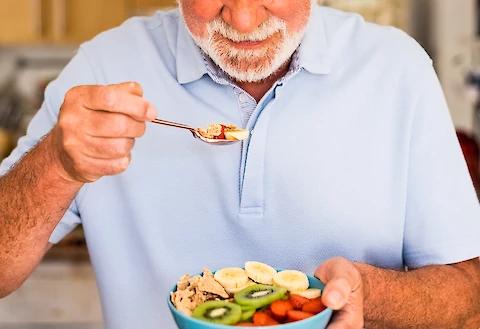
Did you know that something as simple as increasing seniors' fiber intake can significantly enhance their health? Certain aspects of our health, like digestion and heart function, need a bit more TLC as we grow older. This is where fiber can make a difference.
Fruits, veggies, and whole grains are not just sides for main courses, but they are beneficial to seniors' overall health. This Senior Helpers blog post discusses the benefits of fiber in seniors, how to increase their intake, and how to include it in their daily diet.
Understanding Fiber
Fiber is a type of carbohydrate that our bodies can't digest. Unlike other carbs that get broken down into sugar molecules, fiber passes through the body undigested, doing a world of good on its way. How much fiber we should eat per day varies depending on our gender or age, but most people don't eat enough. The average recommended Daily Value for fiber is 28 grams per day for a 2,000-calorie diet, according to the Food and Drug Administration.
Benefits of Increased Fiber Intake in Seniors
The benefits of increasing fiber intake are numerous, especially for seniors. Here are a few:
1. Improved Digestion
An increase in fiber can do wonders for seniors' digestion. It adds bulk to your diet and helps prevent constipation. A fiber-rich diet can keep things moving smoothly through the body, this is especially important for seniors whose digestive system may need a little extra help.
2. Heart Health
Did you know fiber can be your heart's best friend? Many studies have shown a correlation between high fiber intake and lower levels of "bad" LDL cholesterol. This is particularly important for seniors, as maintaining a healthy heart is key to leading an active life.
3. Blood Sugar Control
For seniors dealing with diabetes or pre-diabetes, they may want to consider upping their fiber consumption. Fiber, especially soluble fiber, can slow the absorption of sugar and help improve blood sugar levels. It is a boon for managing diabetes.
4. Aiding Weight Loss
Fiber can also help maintain a healthy weight and even aid in shedding a few pounds. High-fiber foods tend to be more filling, so seniors are likely to eat less and stay satisfied longer, which can help avoid overeating.
Practical Suggestions to Increase Fiber Intake in Seniors
Adding more fiber to seniors' diet is simpler than you might think. Try incorporating more fruits, veggies, and whole grains into seniors' meals, which are all naturally high in fiber. But remember, the key is to gradually increase seniors' fiber intake to avoid any digestive discomfort. Pair their fiber intake with adequate hydration to aid in digestion.
Consultation with Healthcare Professionals
Keep in mind that it is always a good idea to consult with a healthcare professional before making any substantial dietary changes. A doctor or dietician can provide personalized advice to suit seniors' particular needs as well as help them make a smart, high-fiber eating plan.
Senior Helpers Can Help Manage a Healthy Diet
Senior Helpers offers customized, in-home senior care services, including diet monitoring and meal planning. If you live in the Akron, Medina, Wadsworth, or Summit County areas, contact us today at Senior Helpers Akron-Summit. We are happy to help you reach your fiber intake goals!